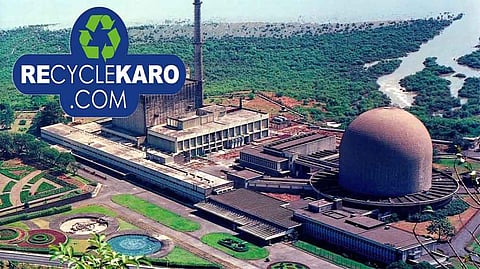

Recyclekaro has entered into a Memorandum of Understanding (MOU) with Bhabha Atomic Research Centre (BARC), India's foremost nuclear research institution. The collaboration aims to utilize/leverage BARC's advanced technology for the extraction of high-purity copper oxide nanoparticles from depopulated printed circuit boards (PCBs).
The produced copper oxide nanoparticles hold immense potential as a catalyst for various industrial processes, antibacterial coatings for medical and electronic devices and sensors, as well as conductive inks and water purification. Beyond the evident environmental advantages, this strategic move is poised to create a positive socio-economic impact by generating employment opportunities throughout the PCB recycling process, from collection and transportation to processing and manufacturing of recycled materials.
Notably, the recovery of precious metals from PCBs not only proves economically viable but aligns with circular economy principles, providing essential raw materials for manufacturing. In light of stringent regulations governing electronic waste disposal in India, this collaborative effort underscores Recyclekaro’s unwavering commitment to sustainability.
Speaking on the association, Mr. Rajesh Gupta, Founder & Director, Recyclekaro, said, "At Recyclekaro, we are committed to exploring innovative methods within the recycling industry. This MOU represents a significant step in advancing our technological capabilities. Our ongoing research and development efforts are driving progress in sustainable technologies and waste management practices, underscoring our commitment to environmental responsibility and our contribution to a more sustainable future."
It's encouraging for Recyclekaro to actively contribute to the efficiency and sustainability of PCB recycling operations using the advanced technologies, aligned with global environmental goals, which emphasize the essential role of technology in addressing electronic waste challenges and promoting responsible resource management. This collaboration reflects our dedication to advancing a cleaner and greener future, and we're pleased to be part of initiatives that positively impact the ecosystem.
Rich in metal content, PCBs are considered a high-value waste. India generates around 3.2 million tons per year of electronic waste, which contains many precious materials. PCB recycling stands as a cornerstone for resource conservation, environmental protection, and economic growth.
Recyclekaro is currently in the stage of establishing its Nickel Metal plant and is in ongoing discussions with new partners for technology transfer, aiming to strengthen the ecosystem. This strategic approach aligns with our commitment to environmental sustainability and the cultivation of a robust Circular Economy and Urban Mining model.
𝐒𝐭𝐚𝐲 𝐢𝐧𝐟𝐨𝐫𝐦𝐞𝐝 𝐰𝐢𝐭𝐡 𝐨𝐮𝐫 𝐥𝐚𝐭𝐞𝐬𝐭 𝐮𝐩𝐝𝐚𝐭𝐞𝐬 𝐛𝐲 𝐣𝐨𝐢𝐧𝐢𝐧𝐠 𝐭𝐡𝐞 WhatsApp Channel now! 👈📲
𝑭𝒐𝒍𝒍𝒐𝒘 𝑶𝒖𝒓 𝑺𝒐𝒄𝒊𝒂𝒍 𝑴𝒆𝒅𝒊𝒂 𝑷𝒂𝒈𝒆𝐬 👉 Facebook, LinkedIn, Twitter, Instagram